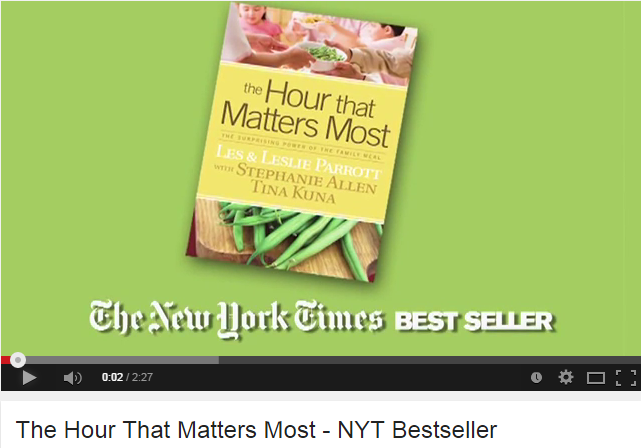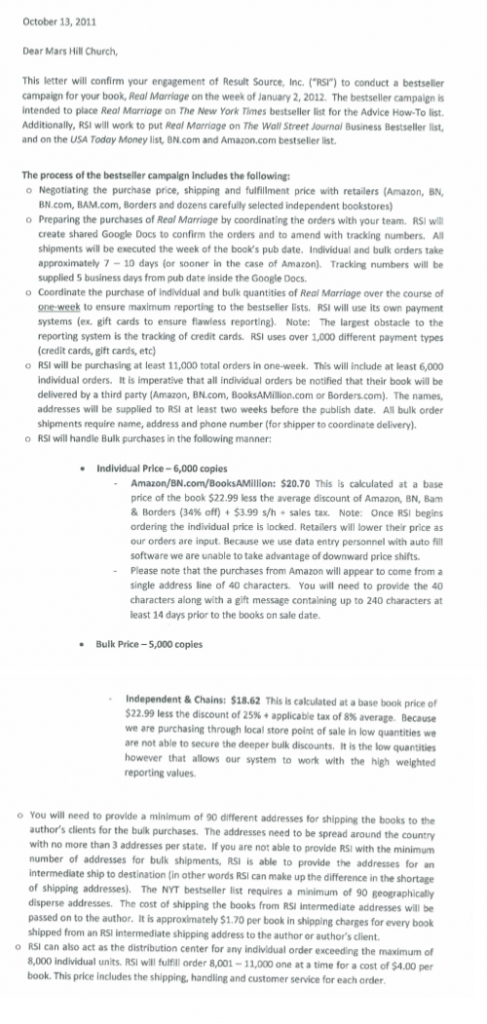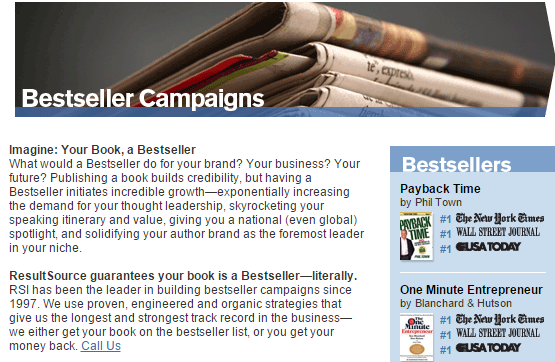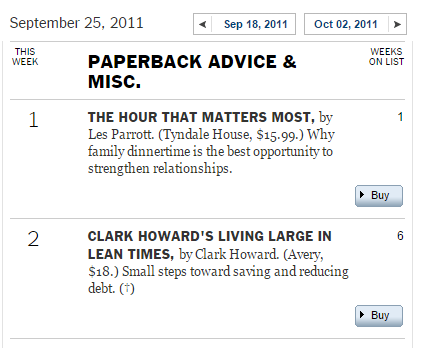This morning, the Daily Beast published my article summarizing recent material I have obtained.
There is still more to develop on this story. For instance, it appears that the web of relationships involving Sealy Yates, Kevin Small, David Jeremiah and the Parrotts is longstanding. I hope to develop that part of the story more this coming week. As I pointed out in the post earlier this afternoon, Driscoll was a late comer to the party and an outsider to the club. Small is on the board of the Parrotts’ non-profit and Yates is on the board of Jeremiah’s Turning Point. Jeremiah credited Small’s publishing genius as far back as 2006.
It is hard to say if these folks will open up and reveal how all of this works.
Whether or not they do may depend on how much more media scrutiny develops. Christianity Today had a small blurb Friday linking to my blog posts. I think other stories are coming.
What I would like to see is a straightforward explanation from the agents, consultants, authors and publishers about the way they work the New York Times system. In the case of Driscoll’s contract, deception was involved. Has that occurred for the other authors? It appears that way but perhaps the agents, consultants, authors and publishers do not believe they are being deceptive. I would like to hear their side of it. Thus far, outside of a promise of a reply that didn’t come from Tyndale House, there have been no replies from those who have engaged in the best-seller campaigns.
When Mark Driscoll used this approach, his critics and the media were all over the story. Where are they now?
Yates and Yates have a significant cadre of authors they represent. Do all of them use ResultSource? I asked two of them but received no answer.
More broadly, I think the NYT Bestseller brand is tarnished by the actions of ResultSource. I asked the NYTs if they planned any kind of correction for those books proven to benefit from gaming the system, and the paper declined to comment.
On WORD-FM (Pittsburgh) last week, I was interviewed by Kathy Emmons. Her suggestion to the NYTs was to permanently ban any author caught cheating.
Clearly, this is a problem larger than evangelical authors but it appears that it would take evangelicals to change course given that some on the inside of this are within the camp.
Tag: Les Parrott
More About Dream Dinners' NYT Bestseller The Hour That Matters Most
On Tuesday, I wrote about Les and Leslie Parrott’s book, The Hour That Matters Most, which made the New York Times Bestseller List at #1 on September 25, 2011. According to the Parrott’s agent Sealy Yates the achievement belonged to Kevin Small who got the book to #1 without a dagger.

In this communication, Yates was talking to a Mars Hill Church staffer with encouragement about the same method Mark Driscoll and Mars Hill Church had agreed to use. Now we know that Mark and Grace Driscoll’s book Real Marriage achieved the Bestseller List status via ResultSource; we also know that Mark Driscoll called the strategy wrong.
There are two other authors of the THTMM, Tina Kuna and Stephanie Allen, co-founders of Dream Dinners, a company that make pre-assembled meals. Dream Dinners hosts a website to support the book, which makes me wonder if these authors also were involved in the contract with ResultSource. I wrote to ask and will report any replies I get. The website makes prominent mention of the NYT Bestseller status.

This is the opening screen of a promo video hosted on the site.
The book spent a week on the Paperback Advice chart and then faded. However, one week is enough for Kevin Small’s “wonderful accomplishment” to provide the lift needed to portray this book as a serious book.
Crossway Books Condemns Manipulation of Bestseller Lists
Monday and Tuesday, I wrote about three Christian authors (David Jeremiah, and Les & Leslie Parrott) who have used help from ResultSource CEO Kevin Small to attain their publishing success. Mars Hill Church’s contract with ResultSource to elevate Mark Driscoll’s book Real Marriage shook public trust in that church. Perry Noble, pastor of New Spring Church, has admitted to using ResultSource to elevate the position of one of his books. There are other authors of books published by Christian publishers who use the ResultSource schemes.
Until recently, ResultSource’s methods were wrapped in mystery. However, with the disclosure of the contract between Mars Hill Church and ResultSource, the public got a look at the service purchased by authors who want New York Times Bestseller status. Essentially the author pays ResultSource to purchase a large quantity of books which ResultSource will send to addresses supplied by the author. If the author doesn’t provide enough addresses in the right geographic areas, then ResultSource will supply them. ResultSource deliberately uses methods which overcome obstacles “to the reporting system” (i.e., deceives the bestseller list). See the excerpt from the contract below for the details.
I asked three Christian publishers — Tyndale House, Harper Collins Christian, and Crossway — for opinions about the use of ResultSource. Tyndale House’s Todd Starowitz told me he would reply when publisher Ron Beers returned from a trip. However, Tyndale did not respond further. HarperCollins Christian did not respond at all. Only Crossway, speaking generally about list manipulation and not individual authors, provided an answer:
From our point of view at Crossway, the bestseller lists are designed to provide an accurate reflection of the market’s response to an author and his or her book. If an author, agent, or publisher intentionally tries to subvert or distort the intended purpose of the bestseller lists, we believe this would constitute an ethical violation, in terms of standard ethical norms, but even more so in terms of Christian ethics. This would be dishonoring to the Lord (to whom we are ultimately accountable), and it would also conflict with our calling to love our neighbors as ourselves (by not creating a distorted or deceptive picture of reality). Christian authors, agents, and publishers are called to a high standard of integrity as we seek to glorify God, not only in the content of what we publish, sell, and market, but also in the way in which we go about this calling.” — Justin Taylor, senior vice president and publisher for books, Crossway
I think Taylor cuts to the heart of the problem with manipulation of bestseller lists. The lists should provide a snapshot of the public response to a book. The public at large seems to see the lists as indicating broad public interest and even quality. However, as it stands, what the list provides is unclear. As the extent of manipulation by Christian and non-Christian authors unfolds, the list may be more of a shadowy glimpse into who has sufficient money to purchase their way into a fiction. Taylor calls the manipulation what it is: unethical. Taylor calls the Christian publishing world to a higher standard. The defense that everybody’s doing it is no defense at all.
Back in June, David Jeremiah’s non-answer to Marvin Olasky’s question about list manipulation provided an insight into another bogus rationale.
Marvin Olasky: TheNew York Times for its bestseller list counts sales from a bunch of secular stores; I understand there’s a company that will go in and buy several books in each of these bookstores. The companies that do that spread the release point of these books that are purchased by individuals so they can get attention. Is that legitimate?
David Jeremiah: The bottom line is you’re selling these books and they’re just not getting noticed. If you want the books to be noticed so that you can reach more people with them, you’ve got to figure out how to do that. I don’t know all of the ramifications of it, but I know that you can’t just write a book and say I’m not going to have anything to do with marketing. If you don’t care enough about it to try and figure out how to get it in the hands of other people, nobody else is going to either.
If you want your books to be noticed, you have to do something about it. It is stunning that David Jeremiah, a man who provides daily bible advice about a host of topics, can say unchallenged that he doesn’t “know all of the ramifications of it.” Dr. Jeremiah, fellow Cedarville University alum, let me ask you to read Justin Taylor’s statement about the ramifications. Let me hasten to add that I don’t know exactly how Jeremiah worked with ResultSource. However, given the direct question about manipulation of sales asked by Olasky, it is disappointing that Jeremiah did not answer it directly.
If he is really unsure of the implications of Olasky’s question, then Dr. Jeremiah should also read Jared Wilson’s article, “What’s Wrong with Buying Your Way onto the Bestseller List. Wilson provided five reasons the practice is wrong:
- It’s dishonest
- It’s egocentric and lazy
- It may eventually harm your reputation and will bug you in the long run
- It’s poor stewardship and bad strategy
- It disadvantages those actually gifted.
See also the comments of the Director of Communications for the New York Times.
At the end of the day, it should not be hard for Christian leaders to understand why fooling the public with a purchased persona is wrong. When Mark Driscoll’s deal with ResultSource came to light, the church initially called it an opportunity, then unwise, then wrong. Eventually Driscoll removed the designation of NYTs best selling author from his bio. What should other authors do who have used this scheme? What should publishers do? At Crossway, there doesn’t seem to be any problem with understanding the ramifications.
Excerpt from the contract between Mars Hill Church and ResultSource. The entire contract is here.

For another inside look at ResultSource in the context of business publishing, see Jeffrey Trachtenberg’s article.
Hey Christian Author: What Would a Bestseller Do For Your Brand?
Les and Leslie Parrott are evangelical Seattle-based authors who specialize in marriage and relationship issues. They have written numerous books, some of which have made it to the New York Times Bestseller List. At least one of those books played a short, peripheral role in the drama that has been Mark Driscoll over the last couple of years. Let me explain.
The Parrotts, like David Jeremiah (who I wrote about yesterday), have worked with Kevin Small, the CEO of ResultSource, in their publishing business. One of things ResultSource does is to conduct Bestseller Campaigns. In such a campaign, they literally guarantee an author that a book with show up on the New York Times Bestseller List or the consulting fee is refunded (see Mark Driscoll and Mars Hill’s contract with ResultSource).

When Mark Driscoll’s literary agent Sealy Yates wanted to set up meetings at Mars Hill to work out the logistics behind the 2011-2012 Real Marriage bestseller campaign, he encouraged the Mars Hill troops by telling them of another successful bestseller campaign just conducted in September 2011. The excerpt below is from a Mars Hill communication from agent Sealy Yates:

In other words Mars Hill Church: see what you have to look forward to by working with “Kevin and his company.”
The Parrotts’ book did indeed make #1 on the New York Times Bestseller List during the week of September 25, 2011.

As sometimes happens with a campaign that games the system, the next week the book fell off the chart. ResultSource uses their many accounts to buy up books during a concentrated period of time. After that, if the book doesn’t continue selling, it drops off the chart.
The Parrotts have referred to Kevin Small as a part of their team and chair of their non-profit organization in previous books. I wrote the Parrotts last week and asked for comment. I also asked publisher of The Hour That Matters Most, Tyndale House, for comment about their part in the scheme. Initially, Tyndale House spokesman Todd Starowitz said last week he would have a comment for me, but nothing has come this week. I have written Sealy Yates and Kevin Small as well with no reply.
I also wrote the New York Times Bestseller List for comment. I wondered if they discovered that religious authors often manipulated sales figures. Danielle Rhoades-Ha, Director of Communications for the New York Times, replied that authors of many types of books engage in such tactics, and explained that “attempts to manipulate our rankings with falsified sales or strategic orchestrated schemes often through legitimate bookstores are by no means limited to books that offer religious and spiritual guidance.”
According to Rhoades-Ha, companies like ResultSource are on the Times’ radar:
In response, we have developed a system to detect anomalies and patterns that are typical of attempts to gain a false ranking and warrant further inquiry. We know which publishers are the most likely to attempt such things. We know what tools they use and with whom — which organizations, special interest web sites, “consultants” and shady order fulfillment houses and retailers — they tend to collaborate.
Given the language used by Ms. Rhoades-Ha, I don’t think the Times approves of these schemes:
Pirate plots abound wherever books can be purchased in bulk through affiliated organizational or corporate funds, churches or political action committees. Other red flags include large anonymous online bulk sales and e-book sales (which do not require traditional inventory accountability) and events and conferences that “give out” books but actually record the book sales as part of the ticket price.
She said that the Times reserves the right to keep titles off the list if they don’t meet their standards and they use a dagger symbol “as a signal to readers that the book attains its ranking largely but not exclusively from bulk purchases.” She added that they attempt to spot those who try to manipulate their rankings.
Tomorrow I examine the ethics of manipulating books sales. I have comments from a Christian publisher and various views on the subject.